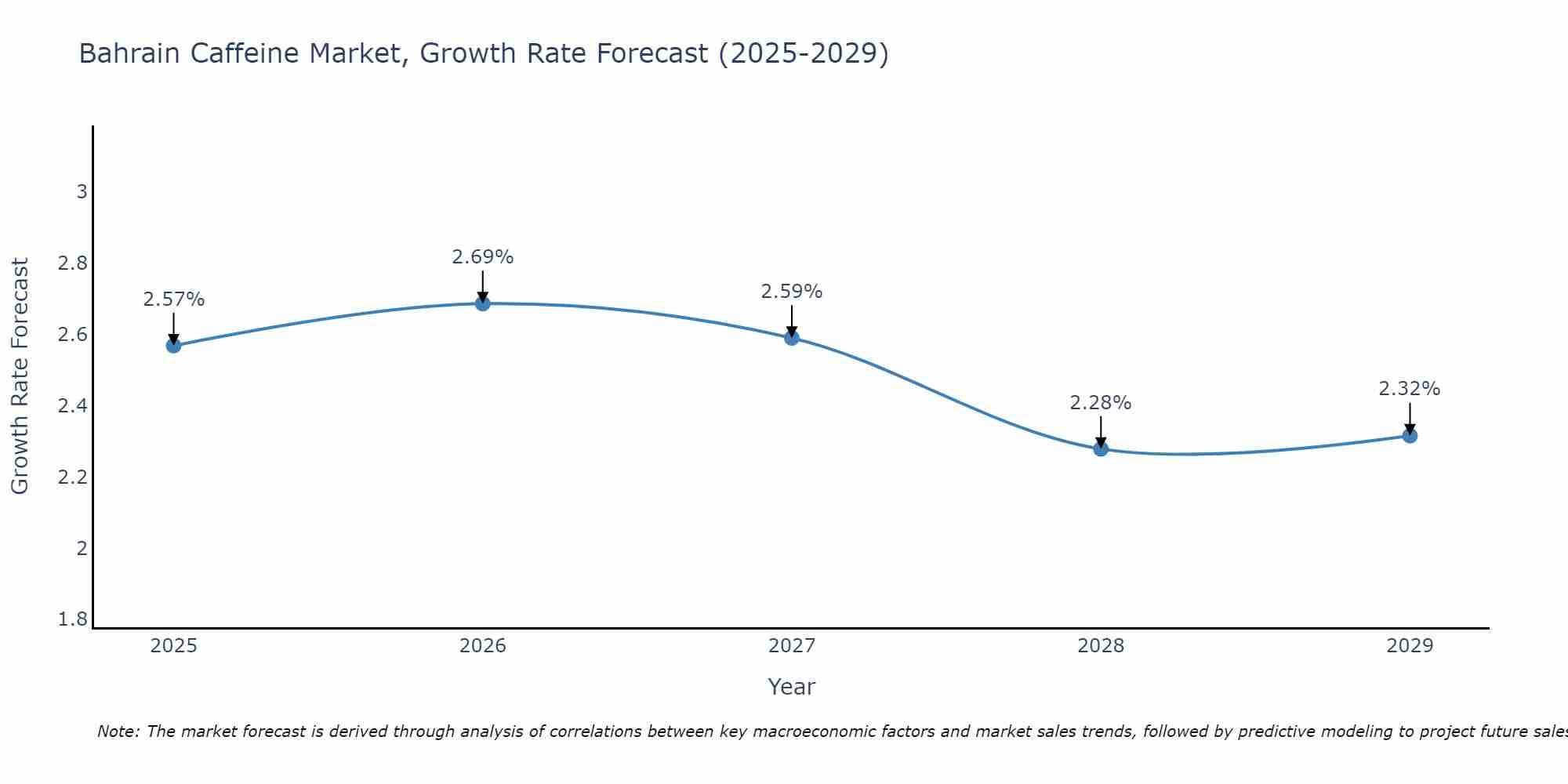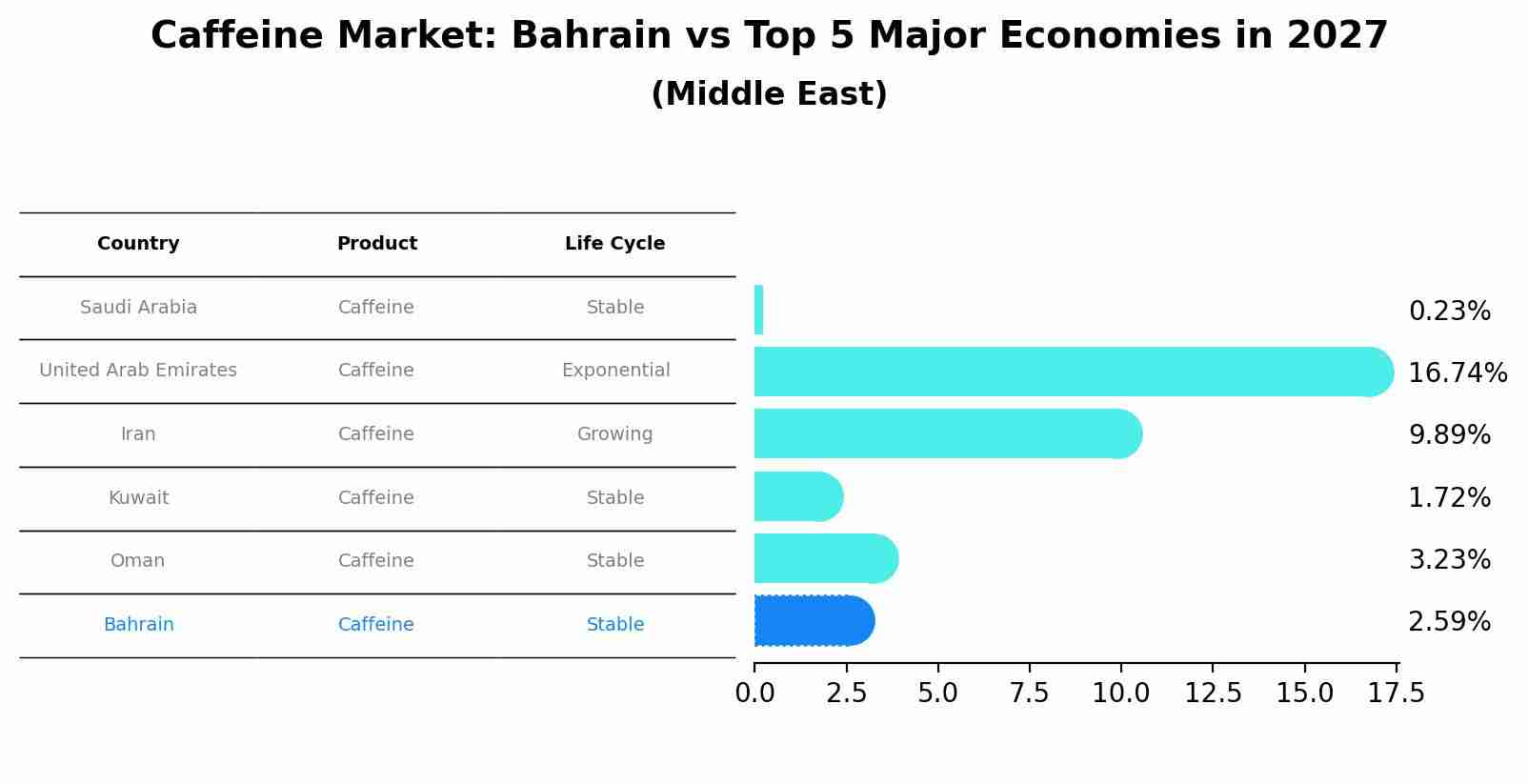Bahrain Caffeine Market (2025-2031) Outlook | Analysis, Industry, Growth, Value, Forecast, Share, Trends, Size, Revenue & Companies
| Product Code: ETC110043 | Publication Date: Jun 2021 | Updated Date: Apr 2025 | Product Type: Report | |
| Publisher: 6Wresearch | Author: Ravi Bhandari | No. of Pages: 70 | No. of Figures: 35 | No. of Tables: 5 |
Bahrain Caffeine Market Size Growth Rate
The Bahrain Caffeine Market is projected to witness mixed growth rate patterns during 2025 to 2029. Growth accelerates to 2.69% in 2026, following an initial rate of 2.57%, before easing to 2.32% at the end of the period.

Caffeine Market: Bahrain vs Top 5 Major Economies in 2027 (Middle East)
The Caffeine market in Bahrain is projected to grow at a stable growth rate of 2.59% by 2027, within the Middle East region led by Saudi Arabia, along with other countries like United Arab Emirates, Iran, Kuwait and Oman, collectively shaping a dynamic and evolving market environment driven by innovation and increasing adoption of emerging technologies.

Bahrain Caffeine Market
Meanwhile, Bahrain caffeine market reflects the country`s vibrant beverage industry, with coffee and tea consumption being integral parts of the culture. The market is influenced by consumer preferences, lifestyle trends, and the presence of cafes and coffee shops, with opportunities for growth in specialty coffee segments and functional beverages.
Drivers of the market
In Bahrain Caffeine market, key drivers include the growing consumption of caffeinated beverages, the rising demand for functional food and beverage products, and the increasing awareness regarding the health benefits of caffeine. Caffeine is a natural stimulant found in coffee, tea, energy drinks, and chocolate, known for its ability to improve alertness, concentration, and cognitive function. The expanding cafe culture, the popularity of energy-boosting products, and the growing trend towards health and wellness in Bahrain are driving the consumption of caffeine. Moreover, the benefits of caffeine as a performance enhancer, mood booster, and metabolism stimulant are further fueling market growth, promoting its usage in a wide range of food and beverage formulations.
Challenges of the market
Challenges in the Bahrain Caffeine Market include the increasing consumer demand for natural and organic caffeine sources, such as green tea and guarana, which offer perceived health benefits and sustainable sourcing credentials. Additionally, concerns about caffeine addiction, tolerance, and regulatory restrictions pose challenges for marketing and labeling caffeinated products.
Government Policy of the market
Government policies may address food and beverage regulations, consumer safety, and health considerations in regulating the production, import/export, and usage of caffeine in food, beverages, and pharmaceuticals. Measures may include labeling requirements, maximum dosage limits, and quality standards to safeguard public health and ensure product quality in Bahrain caffeine market.
Key Highlights of the Report:
- Bahrain Caffeine Market Outlook
- Market Size of Bahrain Caffeine Market, 2024
- Forecast of Bahrain Caffeine Market, 2031
- Historical Data and Forecast of Bahrain Caffeine Revenues & Volume for the Period 2021-2031
- Bahrain Caffeine Market Trend Evolution
- Bahrain Caffeine Market Drivers and Challenges
- Bahrain Caffeine Price Trends
- Bahrain Caffeine Porter's Five Forces
- Bahrain Caffeine Industry Life Cycle
- Historical Data and Forecast of Bahrain Caffeine Market Revenues & Volume By Type for the Period 2021-2031
- Historical Data and Forecast of Bahrain Caffeine Market Revenues & Volume By Natural Caffeine for the Period 2021-2031
- Historical Data and Forecast of Bahrain Caffeine Market Revenues & Volume By Synthetic Caffeine for the Period 2021-2031
- Historical Data and Forecast of Bahrain Caffeine Market Revenues & Volume By Applications for the Period 2021-2031
- Historical Data and Forecast of Bahrain Caffeine Market Revenues & Volume By Pharmaceuticals for the Period 2021-2031
- Historical Data and Forecast of Bahrain Caffeine Market Revenues & Volume By Food for the Period 2021-2031
- Historical Data and Forecast of Bahrain Caffeine Market Revenues & Volume By Beverages for the Period 2021-2031
- Historical Data and Forecast of Bahrain Caffeine Market Revenues & Volume By Flavours and Fragrances for the Period 2021-2031
- Bahrain Caffeine Import Export Trade Statistics
- Market Opportunity Assessment By Type
- Market Opportunity Assessment By Applications
- Bahrain Caffeine Top Companies Market Share
- Bahrain Caffeine Competitive Benchmarking By Technical and Operational Parameters
- Bahrain Caffeine Company Profiles
- Bahrain Caffeine Key Strategic Recommendations
Frequently Asked Questions About the Market Study (FAQs):
Export potential assessment - trade Analytics for 2030
Export potential enables firms to identify high-growth global markets with greater confidence by combining advanced trade intelligence with a structured quantitative methodology. The framework analyzes emerging demand trends and country-level import patterns while integrating macroeconomic and trade datasets such as GDP and population forecasts, bilateral import–export flows, tariff structures, elasticity differentials between developed and developing economies, geographic distance, and import demand projections. Using weighted trade values from 2020–2024 as the base period to project country-to-country export potential for 2030, these inputs are operationalized through calculated drivers such as gravity model parameters, tariff impact factors, and projected GDP per-capita growth. Through an analysis of hidden potentials, demand hotspots, and market conditions that are most favorable to success, this method enables firms to focus on target countries, maximize returns, and global expansion with data, backed by accuracy.
By factoring in the projected importer demand gap that is currently unmet and could be potential opportunity, it identifies the potential for the Exporter (Country) among 190 countries, against the general trade analysis, which identifies the biggest importer or exporter.
To discover high-growth global markets and optimize your business strategy:
Click Here- Single User License$ 1,995
- Department License$ 2,400
- Site License$ 3,120
- Global License$ 3,795
Search
Thought Leadership and Analyst Meet
Our Clients
Related Reports
- India Switchgear Market Outlook (2026 - 2032) | Size, Share, Trends, Growth, Revenue, Forecast, Analysis, Value, Outlook
- Pakistan Contraceptive Implants Market (2025-2031) | Demand, Growth, Size, Share, Industry, Pricing Analysis, Competitive, Strategic Insights, Strategy, Consumer Insights, Analysis, Investment Trends, Opportunities, Revenue, Segments, Value, Segmentation, Supply, Forecast, Restraints, Outlook, Competition, Drivers, Trends, Companies, Challenges
- Sri Lanka Packaging Market (2026-2032) | Outlook, Competition, Drivers, Trends, Demand, Pricing Analysis, Competitive, Strategic Insights, Companies, Challenges, Strategy, Consumer Insights, Analysis, Investment Trends, Opportunities, Growth, Size, Share, Industry, Revenue, Segments, Value, Segmentation, Supply, Forecast, Restraints
- India Kids Watches Market (2026-2032) | Strategy, Consumer Insights, Analysis, Investment Trends, Opportunities, Growth, Size, Share, Industry, Revenue, Segments, Value, Segmentation, Supply, Forecast, Restraints, Outlook, Competition, Drivers, Trends, Demand, Pricing Analysis, Competitive, Strategic Insights, Companies, Challenges
- Saudi Arabia Core Assurance Service Market (2025-2031) | Strategy, Consumer Insights, Analysis, Investment Trends, Opportunities, Growth, Size, Share, Industry, Revenue, Segments, Value, Segmentation, Supply, Forecast, Restraints, Outlook, Competition, Drivers, Trends, Demand, Pricing Analysis, Competitive, Strategic Insights, Companies, Challenges
- Romania Uninterruptible Power Supply (UPS) Market (2026-2032) | Industry, Analysis, Revenue, Size, Forecast, Outlook, Value, Trends, Share, Growth & Companies
- Saudi Arabia Car Window Tinting Film, Paint Protection Film (PPF), and Ceramic Coating Market (2025-2031) | Strategy, Consumer Insights, Analysis, Investment Trends, Opportunities, Growth, Size, Share, Industry, Revenue, Segments, Value, Segmentation, Supply, Forecast, Restraints, Outlook, Competition, Drivers, Trends, Demand, Pricing Analysis, Competitive, Strategic Insights, Companies, Challenges
- South Africa Stationery Market (2025-2031) | Share, Size, Industry, Value, Growth, Revenue, Analysis, Trends, Segmentation & Outlook
- Afghanistan Rocking Chairs And Adirondack Chairs Market (2026-2032) | Size & Revenue, Competitive Landscape, Share, Segmentation, Industry, Value, Outlook, Analysis, Trends, Growth, Forecast, Companies
- Afghanistan Apparel Market (2026-2032) | Growth, Outlook, Industry, Segmentation, Forecast, Size, Companies, Trends, Value, Share, Analysis & Revenue
Industry Events and Analyst Meet
Whitepaper
- Middle East & Africa Commercial Security Market Click here to view more.
- Middle East & Africa Fire Safety Systems & Equipment Market Click here to view more.
- GCC Drone Market Click here to view more.
- Middle East Lighting Fixture Market Click here to view more.
- GCC Physical & Perimeter Security Market Click here to view more.
6WResearch In News
- Doha a strategic location for EV manufacturing hub: IPA Qatar
- Demand for luxury TVs surging in the GCC, says Samsung
- Empowering Growth: The Thriving Journey of Bangladesh’s Cable Industry
- Demand for luxury TVs surging in the GCC, says Samsung
- Video call with a traditional healer? Once unthinkable, it’s now common in South Africa
- Intelligent Buildings To Smooth GCC’s Path To Net Zero


















